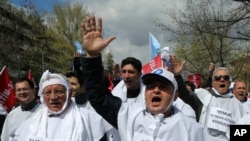Turkey received disappointing economic news Tuesday with an unexpected rise in the country's current account deficit, caused by a severe fall in exports.
It is the latest in bad economic news for the ruling AK Party, which is in a general election campaign. Turkey's economy remains sluggish and the currency is at record lows along with consumer and business confidence. With the opposition placing the economy at the center of its campaign, AK Party could be facing its toughest election yet.
“When it rains it pours” is what Turkish Prime Minister Ahmet Davutoglu could well be thinking about the latest economic figures. An unexpected leap in the current account deficit caused by a sharp decline in exports took the financial markets by surprise.
The news is likely to add to pressure on the Turkish lira, which is already hovering at record lows caused by concerns over the country’s large current account deficit and wider political uncertainty. The timing is inopportune for the prime minister with a general election looming in June. A booming economy has been the bedrock of successive ruling AK Party election victories, but this time, says chief economist Inan Demir of the Istanbul-based Finansbank, the economy is on a worrying slide.
"In 2015, the slowdown seems to have intensified. The consumers and businesses are reluctant to take up large spending decisions. The consumer confidence is low, the business confidence is also low. Since the beginning of the year, Turkish lira is one of the worst performing currencies. Inflation has been a big disappointment," said Demir.
Adding to the AK Party’s economic woes, the rise in inflation is being driven mainly by food prices. A recent headline story in many newspapers was growing complaints over record high prices for food staples like potatoes.
Unemployment too is on the rise, running at a five-year high. Even though the economy is still growing at over 2 percent with Turkey’s young population, a growth rate of around 5 percent is widely considered necessary to absorb new workers into the workforce. Rising unemployment, however, may not be such an electoral liability to the AK Party, says consultant Atilla Yesilada of Global Source Partners.
"AKP has built a vast formal and informal welfare state network. Those worst effected, will not feel the pinch. But the middle classes, the merchants, the small business people will become disillusioned and at least start looking at whether at CHP has something better to offer," said Yesilada.
The main opposition CHP party has made the economy the center of its election campaign, giving up on the previous, failed strategy that focused on the Islamic roots of the ruling party. That strategy may already be working, according to the findings of a recent survey by the Open Society on election attitudes. Ali Carkoglu of Istanbul’s Koc University and chief researcher on the survey says the AK Party’s electoral advantage in the economy is being eroded.
"The main concern has always been the economy and it is so at the present time as well. They still see the AKP as the most effective handler of the economic issues. But that percentage has declined significantly, so in other words the effectiveness of the opposition parties is increasing," said Carkoglu.
The economic credentials of the CHP are widely seen to have been boosted when Kemal Dervish, one of the architects of the economic program that helped Turkey out of its worst economic crisis, joined its ranks. Analysts say for the first time, doubt exists over whether the AK Party will secure an absolute majority. That uncertainty, according to economist Demir, has spread to the financial markets.
"This time round there is considerable uncertainty in both the election outcome itself and what the election outcome entails," he said.
Demir warns that with markets not liking uncertainty, it is likely to only add to growing pressures on the economy ahead of the election. What is more, most analysts say there does not appear to be an obvious market-friendly election result, meaning economic woes are likely to continue, regardless of who is in power.




